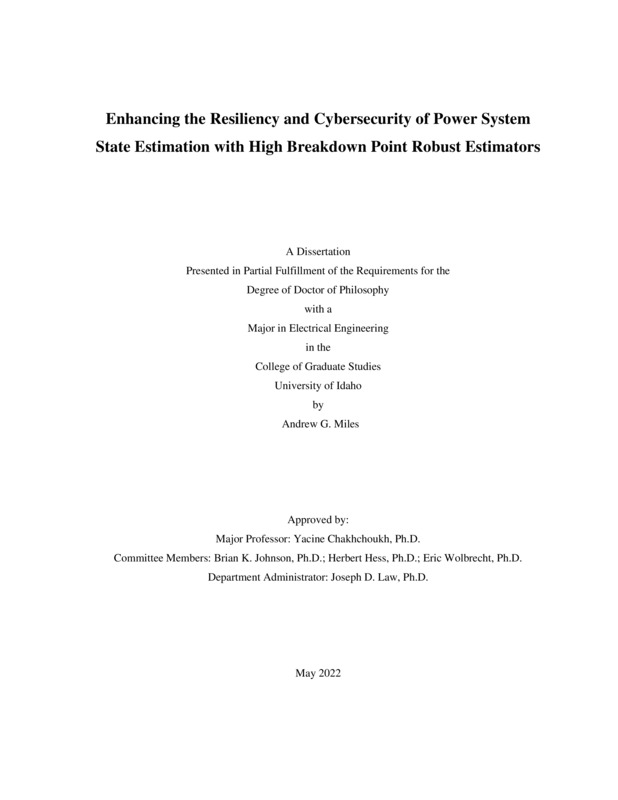Enhancing the Resiliency and Cybersecurity of Power System State Estimation with High Breakdown Point Robust Estimators
Miles, Andrew Gregory. (2022-05). Enhancing the Resiliency and Cybersecurity of Power System State Estimation with High Breakdown Point Robust Estimators. Theses and Dissertations Collection, University of Idaho Library Digital Collections. https://www.lib.uidaho.edu/digital/etd/items/miles_idaho_0089e_12329.html
- Title:
- Enhancing the Resiliency and Cybersecurity of Power System State Estimation with High Breakdown Point Robust Estimators
- Author:
- Miles, Andrew Gregory
- ORCID:
- 0000-0002-0811-2862
- Date:
- 2022-05
- Keywords:
- Cyber-Security Power System Robust Estimators State Estimation
- Program:
- Electrical and Computer Engineering
- Subject Category:
- Electrical engineering
- Abstract:
-
As the power system grows in complexity, so does the need for accurate real-time information. The real-time information allows operators to evaluate a system state to control, plan, automate, and operate the power system. Many of the existing state-estimation methods are based on a Gaussian noise assumption on the error in the measurement data used in the model. The weighted least squares (WLS) estimator, Kalman filters such as the Extended Kalman filter (EKF), and Unscented Kalman filter (UKF), which produce optimal results with this assumption, are popular. However, recent research has shown that measurements errors in phasor measurement units within the power system trend toward non-gaussian probability distributions. Due to the non-gaussian noise, the increased model complexity, and the possible occurrence of cyberattacks, the need for robust estimators has grown significantly. In this work, two robust high-breakdown regression estimators, namely S- and MM-estimators, are adapted and implemented to provide resistance to modeling errors, non-Gaussian noise, and false data injection attacks (FDI). The proposed estimators are applied to two critical future applications. The first considered application is a poly-phase distribution static-state estimator (DSSE). The proposed DSSE estimators show better performance than estimators proposed in the literature, such as the WLS with bad data detection and the robust Huber M-based estimator. The proposed estimators offer more accurate state estimates and energy distribution locational marginal prices (DLMPS) as demonstrated on a modified IEEE 13-bus system in the presence of topology attacks. The second application is a robust distributed or decentralized dynamic state estimator for transmission systems. The distributed dynamic state estimator will be an essential tool for utilizing wide-area monitoring systems (WAMS) using phasor measurement units for control applications. The two robust estimators are implemented for comparison, one in a centralized and one in a distributed or decentralized fashion. The second approach permits the enhancement of resiliency and cyber-security at a reduced computational cost. The IEEE 14- and 118-bus model test cases are implemented to evaluate the proposed distributed dynamic state estimation (DSE) with a transient.
- Description:
- doctoral, Ph.D., Electrical and Computer Engineering -- University of Idaho - College of Graduate Studies, 2022-05
- Major Professor:
- Chakhchoukh, Yacine
- Committee:
- Johnson, Brian K; Hess, Herbert; Wolbrecht, Eric; Law, Joseph
- Defense Date:
- 2022-05
- Identifier:
- Miles_idaho_0089E_12329
- Type:
- Text
- Format Original:
- Format:
- application/pdf
- Rights:
- In Copyright - Educational Use Permitted. For more information, please contact University of Idaho Library Special Collections and Archives Department at libspec@uidaho.edu.
- Standardized Rights:
- http://rightsstatements.org/vocab/InC-EDU/1.0/

